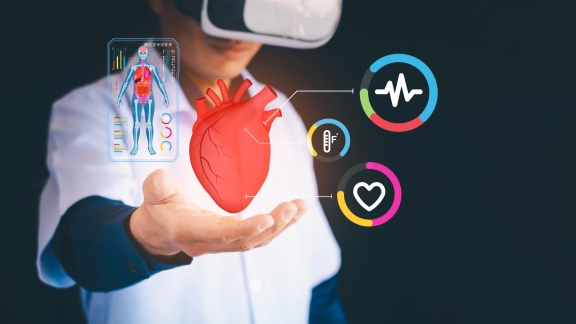
Artificial intelligence and metaverse have become important tools for medical experts in pan-vascular disease diagnosis and intervention, experts told the Oriental Congress of Cardiology and the World Congress of Cardiology in Shanghai on Sunday.
Ti Gong
Medical experts from home and abroad practice Tai Chi.
Cardiovascular disease is the leading cause of death among Chinese people, while pan-vascular disease is a problem featuring atherosclerosis, mainly harming important organs like the heart, brain, kidney and limbs.
The new concept views patients as a whole network for vascular disease prevention and control.
“Pan-vascular disease involves the whole body and requires a more efficient and precise platform connecting doctors and patients for effective management and intervention,” Dr Ge Junbo from Zhongshan Hospital told the congress, which has attracted top cardiologists from home and abroad.
Using AI modelling, local experts are able to identify 95 percent of hypertropic cardiomyopathy, a heart issue which can present with no symptoms, and offer timely intervention and control.
Dr Thomas Gaziano, chair of The Partners Council of The World Heart Federation (WHF) and academic chairman of the congress, said the current quantity of cardiologists can’t meet the demand of the huge number of patients. But the metaverse can help solve the issue and streamline the connection between patients and doctors.
“The metaverse is bringing change and reform to the current medical model,” Ge said. “The basic theory and relevant technologies connecting pan-vascular disease and metaverse have been ready and we are introducing them into clinical practice.
“For example, I have a patient in Nanjing, Jiangsu Province, with heart symptoms. Based on her symptoms and data from wearable equipment, we use AR and VR to form a digital consultation room to offer remote diagnosis for the patient. It is efficient and convenient. It increases the availability of medical service to patients faraway.”
Dr Daniel Piñeiro from The World Heart Federation, added: “Intelligent technology is able to achieve an overall disease prevention, diagnosis, treatment and management. Experts all over the world are working together to improve public health awareness, enhance heart health and reduce burden from cardiovascular disease. We hope to realize the goal of reducing global cardiovascular disease burden by one third in 2030”.







